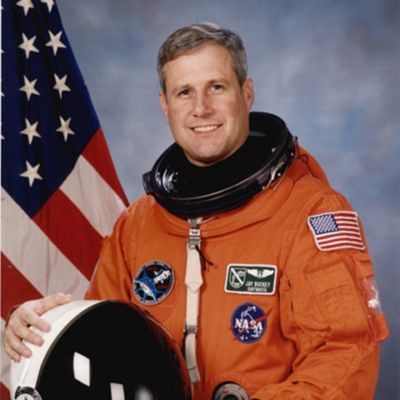
Professor of Medicine at Geisel School of Medicine at Dartmouth
Jay Buckey
eMHIC Special Interest Group on Corrections and Confined Spaces
My interest in developing autonomous, confidential, psychological support tools developed to meet a need at NASA for self-directed psychological tools to support long-duration space missions. Psychological problems are a major challenge for crews on long-duration missions and for individuals in isolated and confined environments. These tools, however, must be engaging, interactive, and easy to use to maintain users’ engagement. Our approach has been to make extensive use of interactive media, based on our early interactions with Dr. Joe Henderson at the Interactive Media Lab at Dartmouth. The interactive-media-based programs we have developed to address conflict, stress, and depression form a suite of programs called the Virtual Space Station. The conflict content has been evaluated with individuals in isolated environments, the stress content has been tested in a randomized controlled trial with business and law students, and the depression program has been studied a Phase II trial with employees, and in a randomized, controlled trial with young depressed individuals in Boston. Through this work we have found that the programs are effective, score highly for usability and for therapeutic alliance, and clearly have applications outside of the space program. They would be particularly useful as part of an employee assistance program, since the need for psychological support in employee health greatly exceeds that capacity available. The next key step, however, is collecting pilot data with employees that could support a major grant to PCORI or the NIH to move these programs into large-scale implementation trials. This project will translate this NASA/NSBRI supported work into a new area that could provide significant benefits to employees. This proposal will collect the needed data from employees about their engagement and use of the programs to support future translational proposals. We have moved the programs from their initial computer-based form to web-based delivery, and have them on a secure server at Dartmouth, so no technological barriers to implementation exist. The employee assistance programs at both Dartmouth-Hitchcock and Dartmouth College are both enthusiastic about the potential of these programs and are ready to participate and enroll participants.
Contribution to Science
- My early career focused on space physiology and medicine. Initially, I worked in the area of cardiovascular physiology, and publication (a) below from this time is now the 16th most cited publication in the Journal of Applied Physiology. The work on central venous pressure in space from this time also resulted in a highly cited publication (b), and the results are still widely discussed. My work with the space program also resulted in two books (c) and (d). The book Space Physiology covers all aspects of space physiology and is used as a text in courses on this topic. The chapter “Psychosocial Support: Maintaining an Effective Team” in this book reviews all aspects of the psychosocial challenges presented by spaceflight.
a) Buckey JC, Lane LD, Levine BD, Watenpaugh E, Wright SJ, Moore WE, Gaffney FA, Blomqvist CG: Orthostatic intolerance after spaceflight. Journal of Applied Physiology 81(1): 7-18, 1996.
b) Buckey JC, Gaffney FA, Lane LD, Levine BD, Watenpaugh DE, Wright SJ, Yancy Jr CW, Meyer D, Blomqvist CG: Central venous pressure in space. Journal of Applied Physiology 81(1):19-25, 1996.
c) Buckey, JC, Homick, JL. The Neurolab Spacelab Mission: Neuroscience Research in Space, NASA SP-535, NASA, Houston, Texas, 2003.
d) Buckey, JC. Space Physiology, Oxford University Press, New York, New York, 2006.
- Much of my work in psychology has involved working on developing and testing the Virtual Space Station (VSS) suite of psychological training and treatment programs in collaboration with James Cartreine, Raphael Rose, Mark Hegel and others. Publication (a) presents the results from early work on the VSS conflict management program, and publications (b,d,e) are evaluations of the VSS depression treatment program. Publication (c) is a randomized controlled trial of the VSS stress content. Publication (f) is an evaluation of the entire suite of programs in an isolated and confined environment.
a) Carter JA, Buckey JC, Greenhalgh L, Holland AW, Hegel MT. An interactive media program for managing psychosocial problems on long-duration spaceflights. Aviation Space and Environmental Medicine, 76(6 Suppl): B213-25, 2005.
b) Carter JA, Buckey JC, Greenhalgh L, Holland AW, Hegel MT. An interactive media program for managing psychosocial problems on long-duration spaceflights. Aviation Space and Environmental Medicine, 76(6 Suppl): B213-25, 2005.
c) Rose, RD, Buckey, JC, Zbozinek, TD, Motivala, SJ, Glenn, DE, Cartreine, JA, & Craske, MG. A Randomized Controlled Trial of a Self-Guided, Multimedia, Stress Management and Resilience Training Program. Behav Res Ther. Nov 21;51(2):106-112, 2012.
d) Berman MI, Buckey JC, Hull JG, Linardatos E, Strassberger AC, Song SL, Cartreine JA, Hegel MT. Therapeutic alliance and depression outcomes with interactive multimedia electronic problem solving therapy. Behavior Therapy 45:358–375, 2014.
e) Sandoval LR, Buckey JC, Ainslie R, Tombari M, Stone W, Hegel M.T., Randomized Controlled Trial of an Interactive-Media-based Problem Solving Treatment for Depression, Behavior Therapy, 48(3):413-425, 2017.
r) Anderson AP, Fellows AM, Binsted KA, Hegel MT, Buckey JC. Autonomous, Computer-Based Behavioral Health Countermeasure Evaluation at HI-SEAS Mars Analog. Aerosp Med Hum Perform, 87(11):912-920, 2016.
g) Anderson AP, Mayer MD, Fellows AM, Cowan DR, Hegel MT, Buckey JC. Relaxation with Immersive Natural Scenes Presented Using Virtual Reality. Aerosp Med Hum Perform, 88(6):520-526, 2017.
Dr Nina Ferencic
Prof. Andrew Greenshaw
Niki Legge
Dr Judith Kuriansky
Fran Silvestri
Mary O'Hagan
Dr Bruce Arroll
Professor Chee Ng
Lucita Lazo
Join the discussion
Don't forget to join a discussion forum on your topic of interest!


